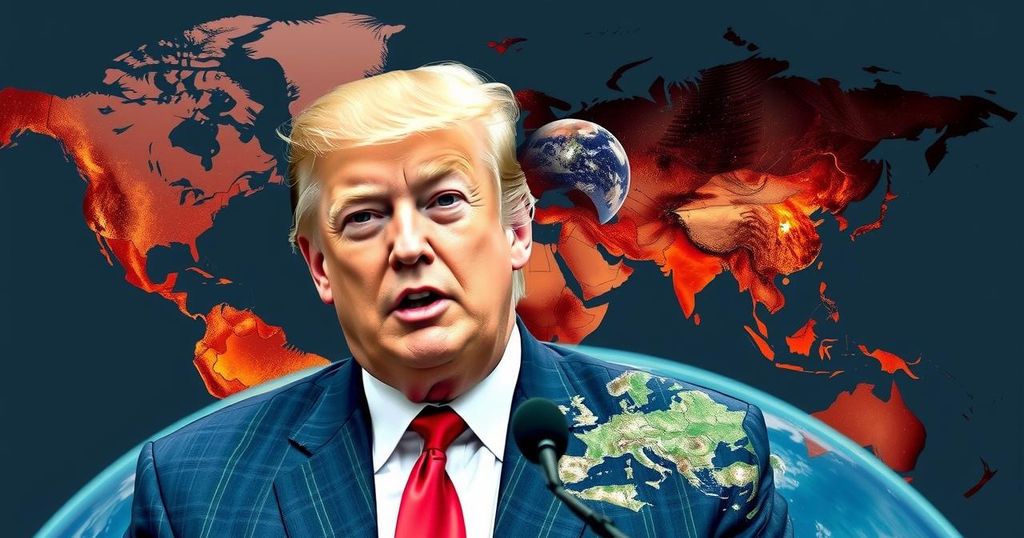Climate Crisis: Implications of Political Leadership on Global Warming

The article examines the alarming climatic developments of 2024, designated as the hottest year on record, primarily due to greenhouse gas emissions from fossil fuels. It explores the severe consequences of climate change, including intense heat, drought, and wildfires in California, followed by the troubling political landscape under a president who dismisses climate science. The implications of the United States withdrawing from the Paris Agreement further exacerbate global efforts against climate change, solidifying the need for immediate action to avert catastrophic outcomes.
The year 2024 has begun with alarming climatic developments, as it has been designated the hottest year on record. This rise in temperatures is primarily attributed to the substantial accumulation of greenhouse gases due to fossil fuel combustion. With global temperatures soaring by 1.6°C relative to the late 19th century, the potential breach of the 2015 Paris Agreement, which aimed to restrict global warming to 1.5°C, has sparked widespread concern. The ramifications of climate change are evident in disasters such as cyclone Chido in Mayotte, flooding in Valencia, Spain, wildfires in Canada, and extreme heatwaves across the United States.
In California, a confluence of high temperatures, drought, and strong winds has created the perfect storm for wildfires, leading to significant damage and loss of life. As the state grapples with urban sprawl and dwindling water resources, the consequences are severe: at least 10 fatalities, extensive property destruction, and the evacuation of about 130,000 residents. This trend of increasingly severe heatwaves is prevalent globally, affecting regions from southern Europe to the Americas and escalating the frequency and intensity of megafires.
Adding to this precarious situation is the imminent inauguration of the United States’ new president, who publicly dismisses climate change as a “hoax” and advocates for increased fossil fuel production. This administration promises to withdraw from the Paris Agreement and dismantle previous climate initiatives, presenting a regressive approach during a critical period for the planet. Furthermore, the political landscape in Europe is shifting away from commitment to the Green Deal, amid ideological and financial reversals tailored to appease popular sentiment.
Most concerning is the recent announcement from major U.S. banks regarding their exit from a global financial alliance designed to support the objectives of the Paris Agreement. This withdrawal signals a dangerous pivot back to fossil fuel financing, potentially undermining global climate efforts. The philosophy behind these political choices echoes Winston Churchill’s sentiment, albeit in a decidedly pessimistic context: reliance on American leadership may come only after exhaustive attempts.
Ecological warnings multiply with each passing day; as nationalism cloaked in climate denial grows in the United States, the costs will likely be borne by all, including American citizens. Should the nation belatedly decide to pursue the correct path regarding climate policy, it may be too late to avert disastrous consequences.
The article addresses the urgent and escalating climate crisis as underscored by the record temperatures of 2024, linked to increased greenhouse gas emissions. It highlights various catastrophic events across the globe fueled by climate change, emphasizing the interconnectivity of these crises and the need for global cooperation to mitigate future risks. The narrative critiques the political response in both the United States and Europe, warning of the dangers posed by climate change denial and regression in climate policies, particularly under a leadership that favors fossil fuel expansion over sustainable practices.
In conclusion, the current trajectory of climate-related policies, especially in the United States under the forthcoming administration, poses a significant threat to global climate agreements and efforts to combat climate change. The dire consequences of legislative and ideological shifts away from environmental sustainability could amplify already critical situations worldwide. A collective action to uphold and advance climate initiatives is imperative now more than ever, lest we face dire repercussions that could exceed our capacity to respond effectively, reinforcing the urgent need for a unified approach to addressing climate issues.
Original Source: www.lemonde.fr





